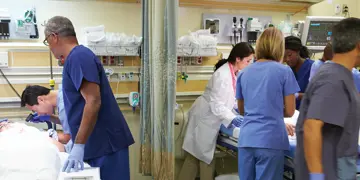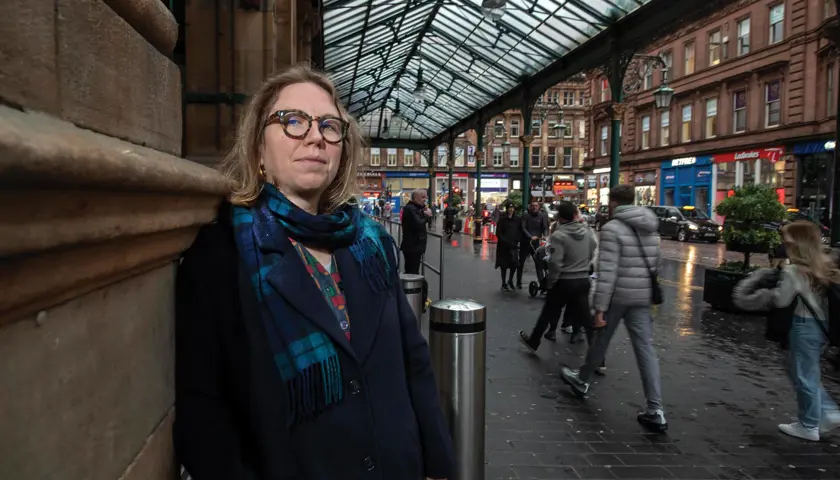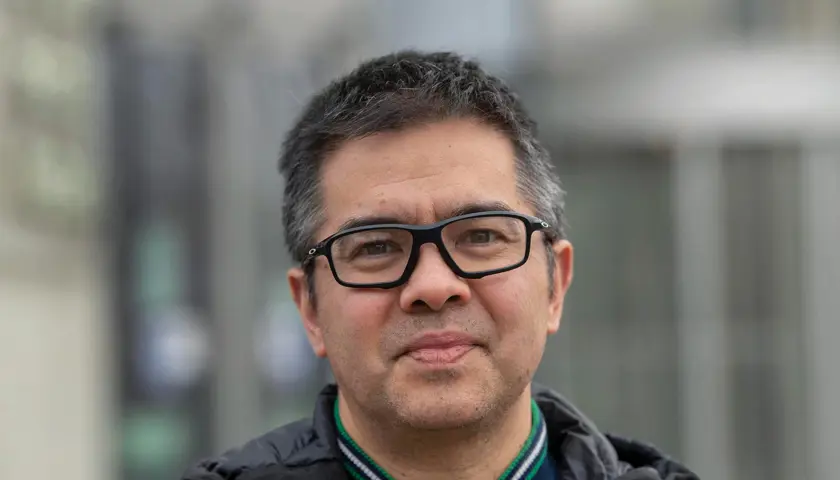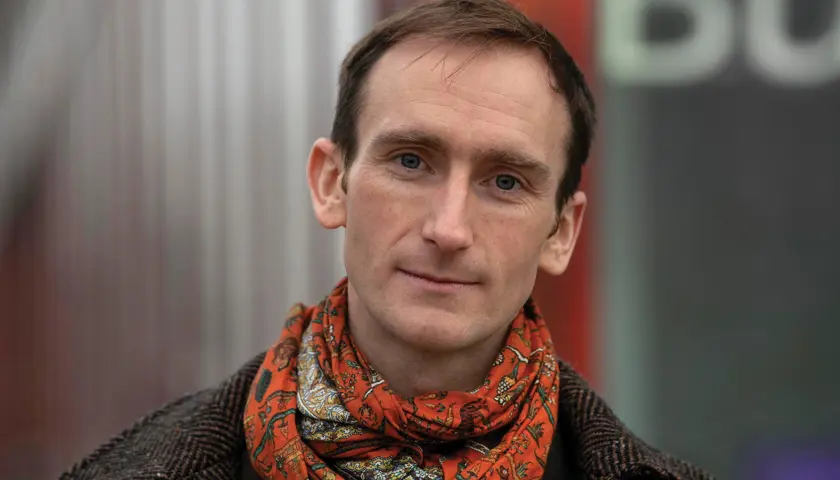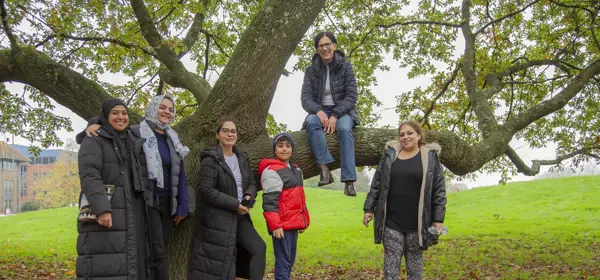Inequality is an emergency too
Inequality is an emergency too
It might be hard to see a chaotic emergency department as presenting 'opportunities', but a group of doctors committed to tackling health inequalities say they can be places where meaningful interventions can be made which benefit patients – and reduce pressure on emergency medicine
Ask Joanna Quinn why she does what she does and she only has to think back to the previous weekend of night shifts working in an emergency department in Glasgow’s East End.
‘I saw a guy who had just spent 10 years in prison and was struggling to readjust. Prison just hadn’t prepared him at all. He was suffering with abdominal pain, he had been an IV drug user and he was absolutely terrified to come to hospital – he had been putting it off and eventually turned up in the middle of the night.
‘Here was this big, tough lad who was sobbing and in pain and scared and I just despaired thinking about his life chances. He just hadn’t had the opportunities others have had, he was only in his 50s but his health was pretty poor – physiologically he was much older.’
Later that weekend Dr Quinn, who was born and raised in Yorkshire and came to Glasgow via London and a range of roles overseas, saw a homeless patient who had come out of prison and been left to live on the streets – back in the embrace of drug use, which likely started while inside. Both doctor and patient felt ‘hopeless’.
These aren’t unusual cases. That weekend was full of such stories, each a damning indictment of the state of society – each acting as motivation for someone with a burning sense of injustice in their core.
Your chances of ending up in an emergency department are not equal across society
Ryan McHenry
As Dr Quinn says: ‘Nearly every patient has an element of poor life chances.’
Or, as one of Dr Quinn’s peers, a consultant called David Chung who also works in emergency medicine, more brutally describes things: ‘This is shit life syndrome.’
Recent patient stories stand out for Dr Chung, too. One patient had been brought to the emergency department by police and was suicidal. After spending some time trying to understand, it became clear the man was a prisoner in his own flat, which had been taken over and used as a drug den and party venue.
Dr Chung says: ‘Wouldn’t you be expressing extreme despair and possibly suicidal ideation if that was you? What this man needed was some police support and a locksmith. He may not really have had a mental health issue at all. We were able to effect those changes and help. That needs to be a more mainstream solution.’
For Dr Quinn, who had come into medicine hoping to work for Médecins Sans Frontières to help the poorest and most vulnerable and has also worked in refugee camps, with street homeless people in Greece, and trying to improve care in rural Myanmar, there has been a stark realisation: ‘You don’t have to fly halfway across the world to make a difference in disadvantaged populations.’
It is exactly these sorts of experiences which led to a group of doctors, including Dr Quinn, in Scotland to found the Emergency Medicine at the Deep End group – a project which aims to bring doctors together to try to intervene to mitigate these inequalities in emergency care.
The group aims to make the case that people experiencing socio-economic disadvantages have higher rates of emergency attendance – that the disease burden is significantly higher in deprived groups, with resultant high levels of premature and excess mortality and that patients from these areas are more likely to die from critical illness, regardless of severity. The group believes these issues are not niche, not areas of special interest, but fundamental to the work of emergency medicine and that addressing health inequality is a pursuit of social justice and an ameliorating prospect for emergency departments under huge pressure.
The project was conceived around clinical research fellow Ryan McHenry’s kitchen table. Dr McHenry, an emergency, pre-hospital and retrieval medicine registrar in Glasgow, who also researches deprivation, isolation and emergency care, had been wanting to raise awareness of the social determinants of health since his first experiences on a Glasgow hospital respiratory ward.
There’s definitely an element of compassion fatigue and moral injury and I see it in a lot of colleagues
Joanna Quinn
The son of two parents who met working with kids excluded from school in inner-city Belfast, Dr McHenry – who trained in Dundee and has been in Scotland’s biggest city ever since – says: ‘It was the East End of Glasgow, with the worst social deprivation in Western Europe on our doorstep, and the thing that became very quickly clear was that every single person who was on that ward was there because of a disease that you could say had been inflicted on them by society – people were suffering the effects of asbestos from Glasgow’s industrial past, or from smoking or drugs.
'And moving into emergency medicine that just became increasingly clear. The truth is that your chances of ending up in an emergency department are not equal across society.’
Ask a layperson on the street and they may well believe the chances of ending up in a hospital emergency department, or needing hospital care, are largely equal from one person to the next. In reality this could hardly be further from the truth.
And Dr McHenry spells out the reality: ‘If you experience social deprivation, you’re more likely to have an emergency illness, you’re around three times more likely to require intensive care. If you’re in the most deprived 10 per cent versus the most affluent 10 per cent you’re also more likely to have a bad experience in your emergency department – the work that we have done shows you’re more likely to wait for more than 12 hours for a bed if you’re in the most socially deprived groups.
‘This is fundamentally unjust, and we can’t stop feeling that that’s unjust.’
For Dr Chung, the motivations are similar, but having worked in emergency medicine in Glasgow since the 1990s, history also brings a sense that change is possible. Dr Chung saw the ‘immense power’ of a concerted public-health approach to knife crime and violence, previously just seen as a criminal-justice issue. ‘It needs all of us to start thinking like that – working out what the real problem is – and feed into it,’ he says.
The group follows the now long-established Scottish Deep End project, which is made up of a group of GPs from the 100 most socio-economically deprived practices in Scotland. It has had significant success in raising awareness of health inequalities and affecting public policy. Their model has been adopted internationally, with 16 Deep End groups operating in seven countries and the entire project is founded around a relentless drive to overturn the inverse-care law.
Dr McHenry says: ‘We need to recognise we do not have one of the big tools GPs have to make a difference in this area – continuity. But we do have, we think, a reachable moment for people who might not otherwise actually usually present to the GP – I firmly believe there is nowhere else in society where people turn to whenever they have lost all hope or they’ve nowhere else to go like they do in our department. We have to accept both those things.’
Whereas in general practice the Deep End group has a long-established presence – their narrative understood and their influence consistent from grassroots to national policymakers – these are early days for this new project.
As things stand the NHS often sees language like ‘frequent flyers’ or ‘high-volume service users’ and hospital philosophies grounded in principles of moving people on quickly and reducing numbers coming through the door. Success for this group of doctors would be moving from those narratives to seeing the emergency department attendance as an opportunity – as a moment of intervention, which could have a significant effect.
To ignore it is just going to lead to more despair
David Chung
‘We all know emergency departments are in crisis at the moment, and the last thing we want is to put more burden of work on to the emergency departments to try to solve society’s health problems. That is absolutely not what this is about,' says Dr McHenry.
'I suppose what we want, what ultimately we think is maybe useful, is to say, we do have a reachable moment for some people to be able to try to change some part of whatever has brought them to the emergency department at that time. And that doesn’t necessarily need to be delivered by emergency clinicians.’
If common sense or morals don’t drive the approach, then perhaps the evidence can. Dr McHenry cites a study, which shows the positive effects of putting smoking-cessation workers into emergency department waiting rooms – providing cost-effective services. And, as we speak, he’s also preparing to tell delegates at a Royal College of Emergency Medicine conference that emergency attendances dropped by 29 per cent, and scheduled care increased, following the introduction of a navigator programme intervention in an emergency department.
He says: ‘This is hard to do when our emergency departments are overflowing as it is, and people are really coming to harm. It’s not about all emergency physicians becoming social workers or us trying to somehow undo the continuities that the GPs have by stepping into that place. We know that intervention to try to improve people’s lives actually has the ability to reduce use of emergency care, and therefore it’s worthwhile doing whether there’s an emergency care crisis or not.’
Unmet need
Doctors working in Deep End projects frequently speak of the comfort and positivity they get from being part of a collective – from fostering a sense that together, big issues can seem a little less insurmountable. In an environment where doctors have been on the front line through permacrisis and so many are burned out or dealing with moral injury, could this sort of project present an aid to those serious issues, if not a solution?
Dr Quinn says: ‘There’s definitely an element of compassion fatigue and moral injury and I see it in a lot of colleagues. I think this is giving me hope. It doesn’t change the fact that sometimes things can feel pretty bleak – when the department is full to bursting and you’re struggling. But I have a renewed sense of purpose and hopefully we will see some changes eventually.’
There are many challenges ahead for the group. Winning hearts and minds can be a long process and even then influencing policy decisions and driving real change remains a major challenge.
A first step is to make a convincing case for a move away from demand management and promoting an understanding of ‘unmet need’. This, the group says, ‘better represents the reality of people who don’t choose to be in hospital, but attend because their needs aren’t met elsewhere’.
The group hopes to crystallise the benefits of social interventions in emergency departments such as the care navigators programme in Scotland and to advocate for a sustainable integration of similar schemes everywhere.
The project will be driven by new research, often led by Dr McHenry, and strong advocacy, following the GPs at the Deep End project, for recognition of the effects of social deprivation on the delivery of emergency medicine.
Every single person was there because of a disease that you could say had been inflicted on them by society
Ryan McHenry
Many of these arguments need to be won broadly, but also in emergency departments where not all staff are like-minded. The group will look to campaign for a much greater focus on inclusion health – particularly health equity, the social determinants of disease and training in trauma-informed care – in education and training at all levels.
‘It’s a daunting prospect to take on,’ Dr Chung says. ‘But to ignore it is just going to lead to more despair … To really get to the heart of what is wrong and what is bringing people into emergency medicine we need to accept that there is a social element, an economic element and a political element. If you don’t start to think about these things then perhaps you’re not doing as much for your patients as you could.’
(Photo credit: Douglas Robertson)


